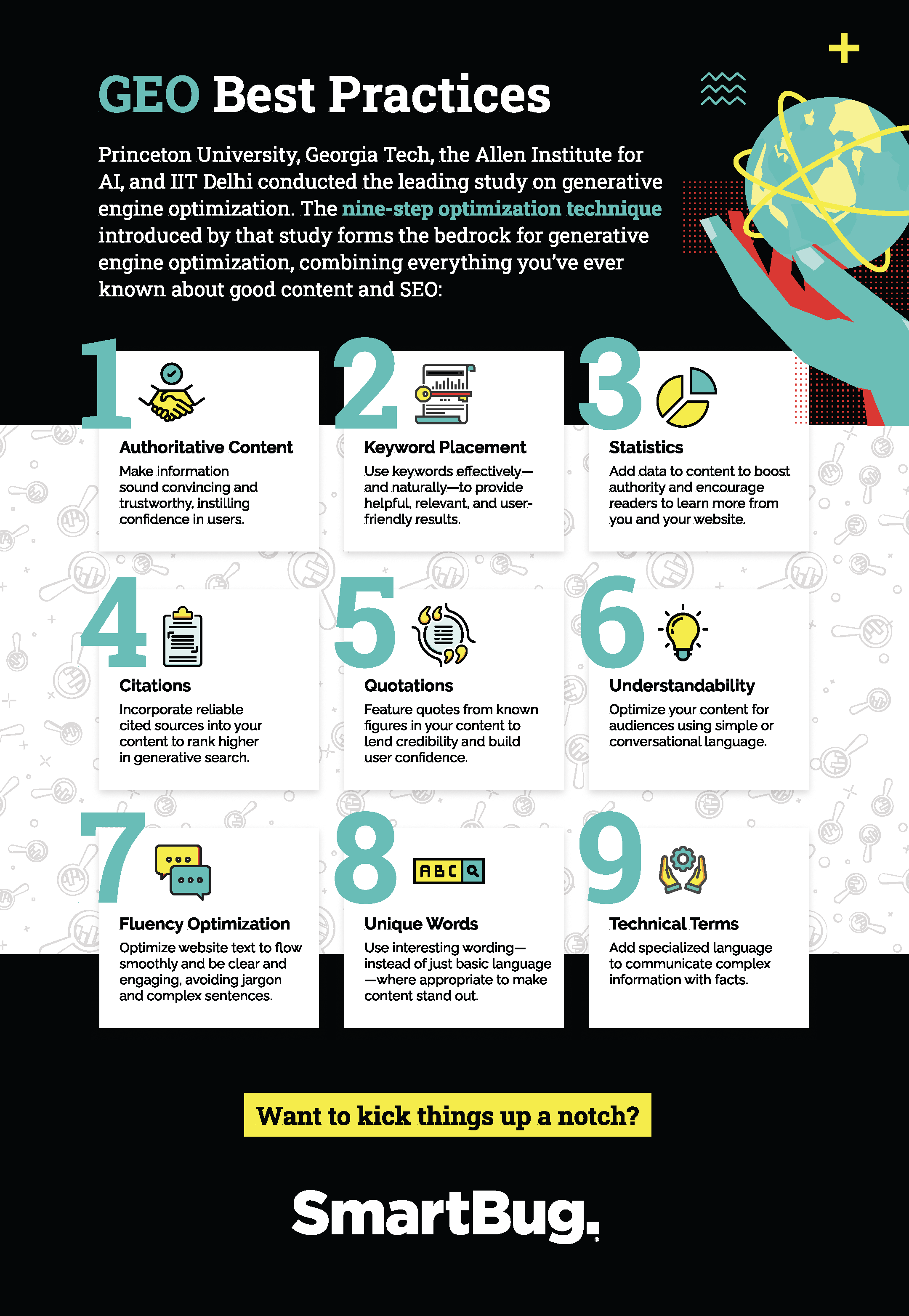
An oldie-but-a-goodie, search engine optimization (SEO) is a digital marketing staple. Blog posts. Keywords. Google changing the rules seemingly every day. You definitely must stay sharp to hit the top of search engine results pages (SERPs). But it’s not just one tech giant writing the script today—it’s the entire technology landscape.
The next frontier? Generative engine optimization (GEO), drawing on the rapid ascent of artificial intelligence (AI). Take a trip down memory lane to see where SEO has taken us so far, and explore the importance of GEO in future-proofing your SEO strategies.
The Evolution of SEO
SEO has been a driving force in digital marketing for years, bringing websites and search engines together as the latter crawled and ranked content based on algorithms. But it has changed a lot along the way. You probably remember the golden age of SEO and its trademark keyword stuffing—and the resulting unnatural content. Fortunately, that was just a phase (kind of like bedazzled jean jackets).
We kept learning and refining as SEO eventually shifted to organic keyword use, backlinking, and meta tags, leading to better value that helped readers and search engines understand content relevancy. And now? Users and search engines alike can make better sense of what’s available on that vast expanse we call the internet.
But we’re never done, either. Artificial intelligence puts us on the cusp of the biggest evolution in search to date: using AI for SEO and the rapid rollout of AI-driven search engines.
Understanding GEO
Traditional search engine or generative search engine? Traditional sources—including Google and Bing—simply fetch and display information from websites, whereas generative search engines leverage AI to sync information across sources and produce unique responses. But you can still make it better.
Users are doing more than just typing a few words into Google and tapping on the top result—they’re entering robust queries to get summarized information. Generative engine optimization was born from the rise of AI-driven search engines such as Google's Search Generative Experience (SGE) and Bing Chat, and it’s about way more than retrieving information. GEO optimizes content to increase visibility in AI search results, combining traditional SEO with an understanding of how generative AI models process and prioritize content.
The Technology Powering GEO
So if you look under the hood, what makes these AI search engines rev? A combination of complex, data-based technologies.
For one, AI-powered algorithms help prioritize content relevance and user intent, enabling generative engines to prioritize content relevance and deliver better search results. Additionally, natural language processing (NLP) models analyze and understand human language for parts of speech, named entities, and sentiment to understand search queries and generate human-like text. Machine learning algorithms use datasets to understand user behavior, continuously learning to improve search results and rankings and optimizing content for what users find most valuable or engaging.
Why the Shift to GEO Is Inevitable
Traditional search engine optimization enhances discoverability for your brand in search results. But it’s not without flaws; SEO relies heavily on keywords and static content optimization.
Compared side by side with generative engine optimization, SEO is less flexible in adapting to dynamic content generation and doesn’t cater to audience needs and intent. SEO is also a slow-burn strategy, and it often takes months for search engines to catch on to optimizations.
Think about what you need to achieve and adjust your strategy accordingly. SEO excels at improving SERP rankings and organic traffic, but GEO can improve visibility, engagement, and rankings influenced by AI.
Moving Beyond SEO Limitations
AI and machine learning are reshaping search engines and content creation. Generative engine optimization overcomes SEO limitations with contextually relevant content creation and optimization.
GEO works hand in hand with the advanced content analysis AI engines perform with an eye toward optimizing content so it can be summarized by AI. With the help of GEO, you can structure content in ways generative models can understand—answering questions for AI-driven query responses.
Where should you begin your journey? GEO efforts may vary depending on the subject domain, such as using authoritative language for historical content or citation optimization for factual queries. And though the area is still growing, the industry is adding to a rapidly growing list of best practices each day.

GEO Best Practices
Princeton University, Georgia Tech, the Allen Institute for AI, and IIT Delhi conducted the leading study on generative engine optimization. The nine-step optimization technique introduced by that study forms the bedrock for generative engine optimization, combining everything you’ve ever known about good content and SEO:
- Authoritative Content: Make information sound convincing and trustworthy, instilling confidence in users.
- Keyword Placement: Use keywords effectively—and naturally—to provide helpful, relevant, and user-friendly results.
- Statistics: Add data to content to boost authority and encourage readers to learn more from you and your website.
- Citations: Incorporate reliable cited sources into your content to rank higher in generative search.
- Quotations: Feature quotes from known figures in your content to lend credibility and build user confidence.
- Understandability: Optimize your content for audiences using simple or conversational language.
- Fluency Optimization: Optimize website text to flow smoothly and be clear and engaging, avoiding jargon and complex sentences.
- Unique Words: Use interesting wording—instead of just basic language—where appropriate to make content stand out.
- Technical Terms: Add specialized language to communicate complex information with facts.
Want to kick things up a notch? Consider a handful of other valuable strategies that build on SEO and content principles.
Quality and Originality
Produce in-depth, quality content that’s valuable beyond what’s readily available for AI to prioritize.
AI Accessibility
Focus on making information clear with headings, bullet points, and structured data markup to help the AI models better understand content.
E-E-A-T
Continue to leverage experience, expertise, authoritativeness, and trustworthiness (E-E-A-T), including using backlinks and sources.
Grow Your Brand with GEO
Remember “Pink is the new black”? Think of GEO as the new SEO. Search is changing with the rise of AI. Neither will cancel the other out completely; rather, they will build on each other and what we already know. Keywords, backlinks, and more still have a place in generative engine optimization—the technological underpinnings are just shifting. AI can help you distill information in search engines to reach the right audiences.
Begin your journey toward GEO and stay competitive in the digital landscape.
About the author
Courtney Fraas is a SmartBug Media Inbound Marketing Strategist based in Savannah, GA. With eight years of marketing experience, Courtney specializes in copywriting, visual design and project management. When she isn’t crafting customer-focused messaging, Courtney is busy traveling near and far, playing with her pup, and becoming an expert Airbnb host. Read more articles by Courtney Fraas.








